I know it’s called Civil War II but repeating the exact same dumb-arse story beat as in the original Civil War a decade ago is a bad move. What the hell, guys?

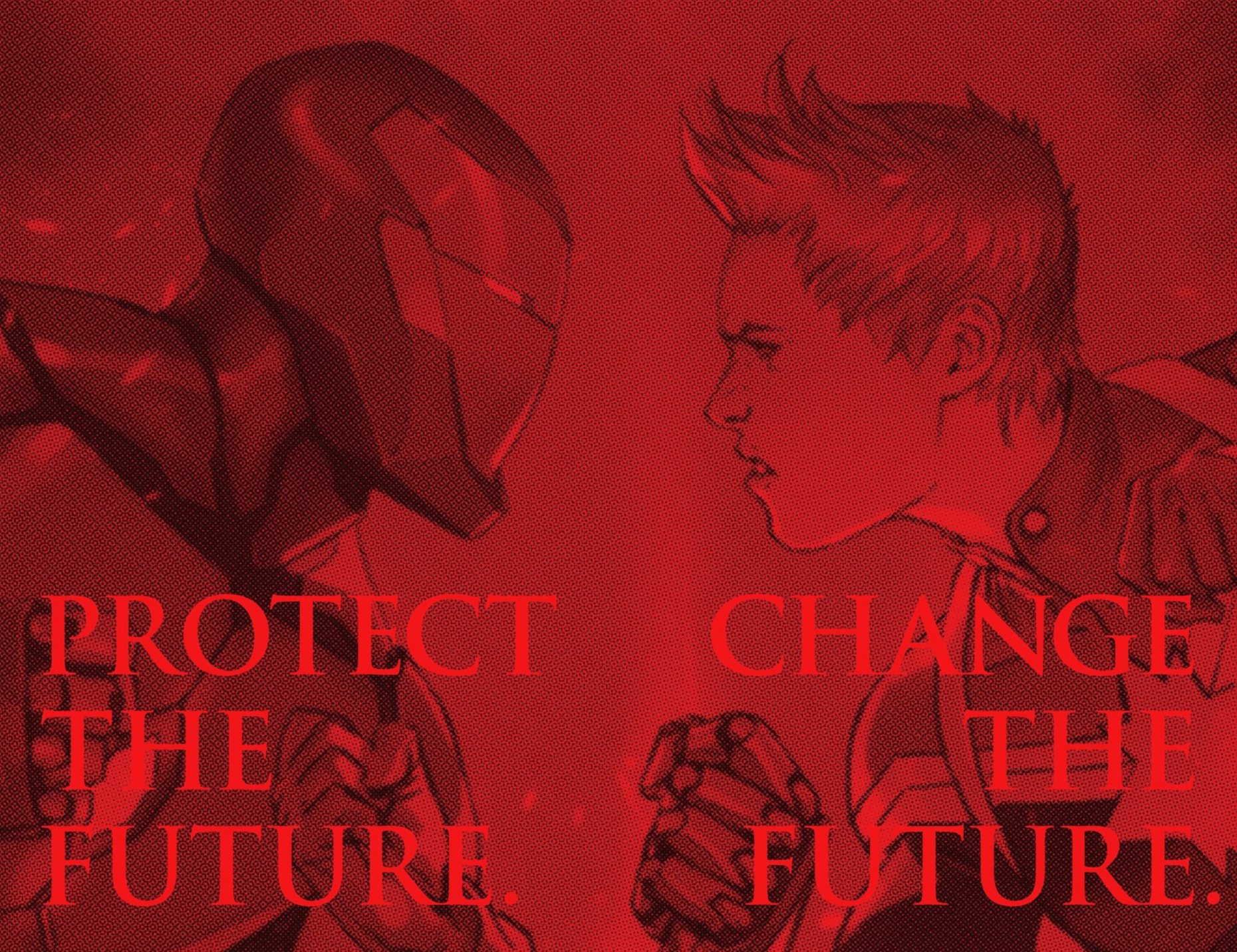
The last time Marvel Comics did a Civil War event, they killed a black superhero character. Ten years later, they have done the same thing. This time, the victim is James “Rhodey” Rhodes, Tony Stark’s best friend and the man who wears the War Machine armour. Rhodey’s on-panel death actually happened weeks ago in a Civil War preview that came out in Marvel’s Free Comic Book Day title.
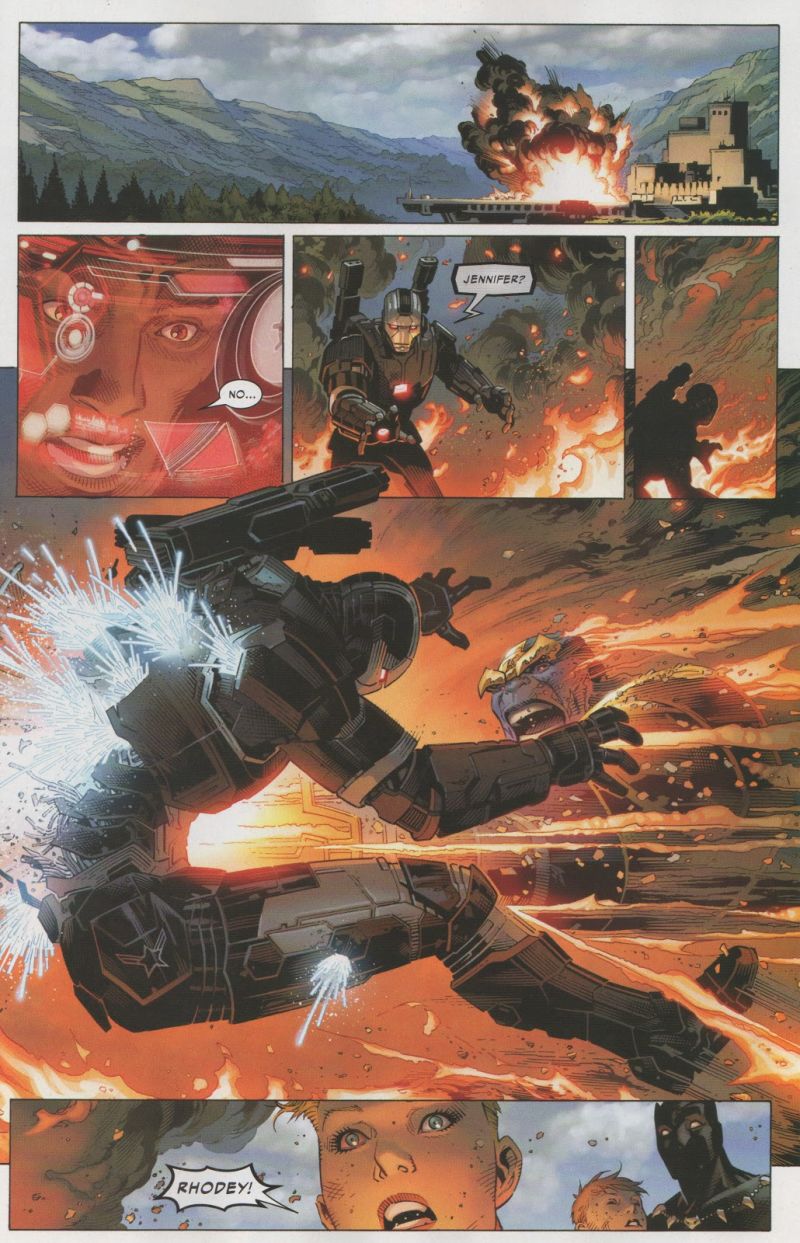
Last week’s Civil War #1 just confirms that he’s deceased.
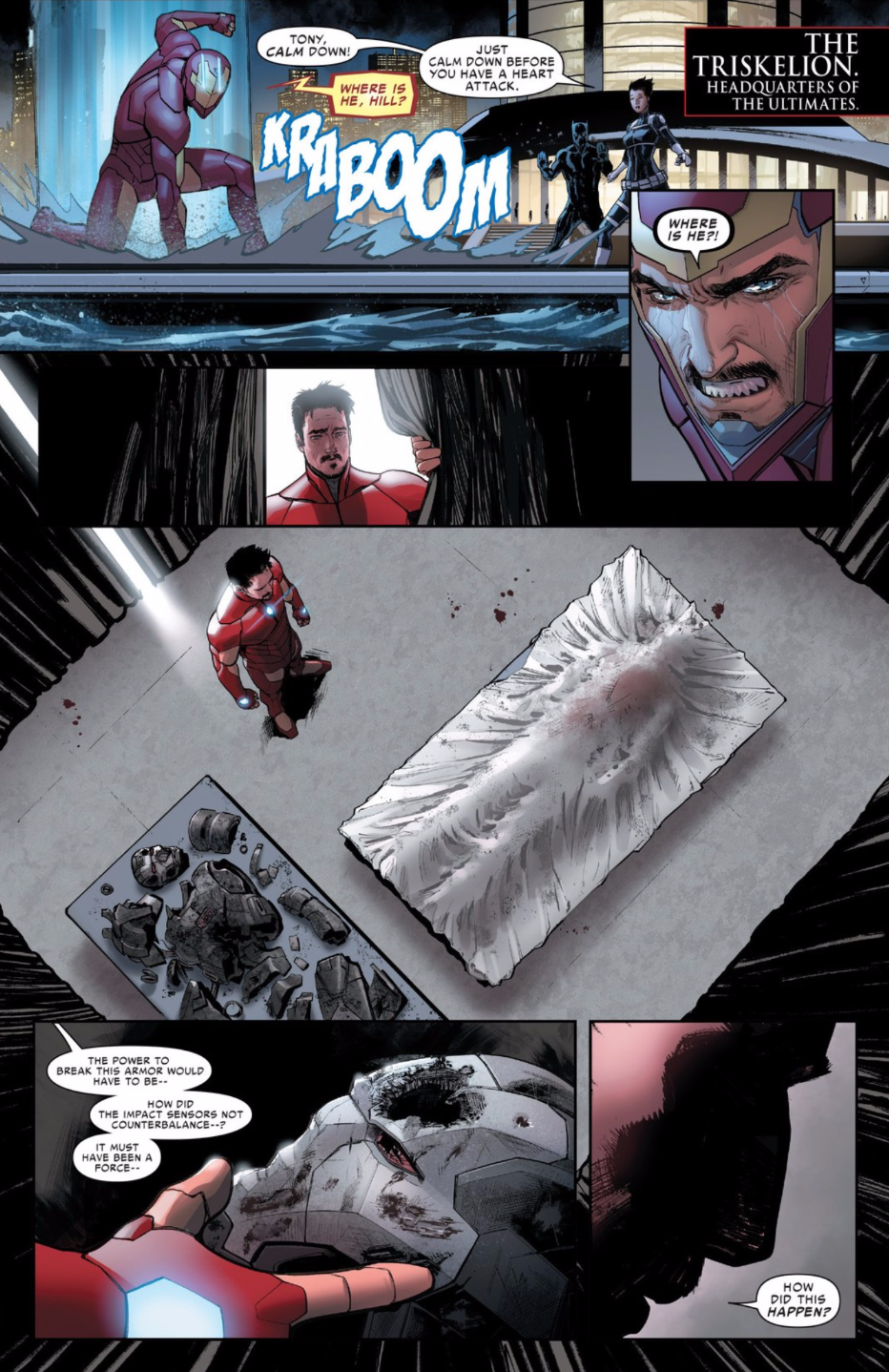
That Free Comic Book Day story makes a point of pulling Carol Danvers’ romance with Rhodey to the foreground, for what is clearly a dramatic set-up.
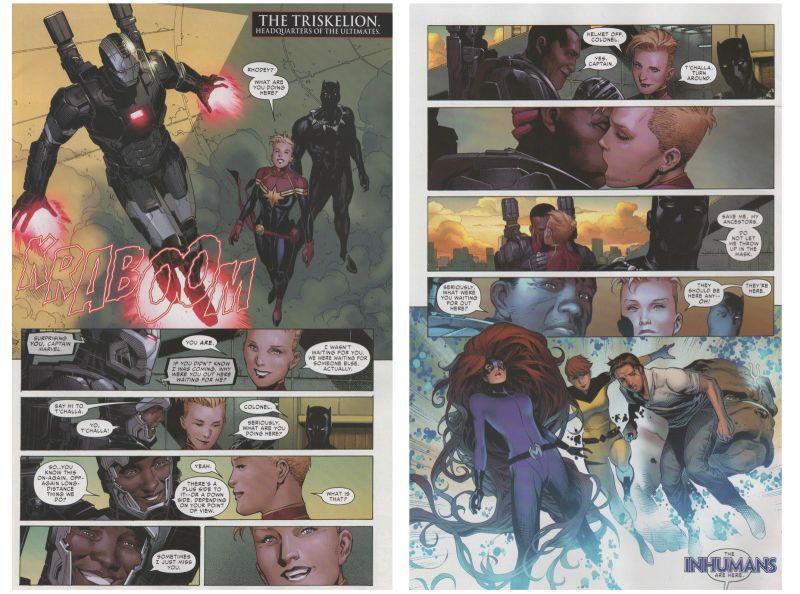
Two weeks ago, Civil War #0 gave readers a look at Rhodey taking a meeting with the President of the United States. The silhouetted Commander-in-Chief tells Rhodey that he could — no, should — be the first superhero president.
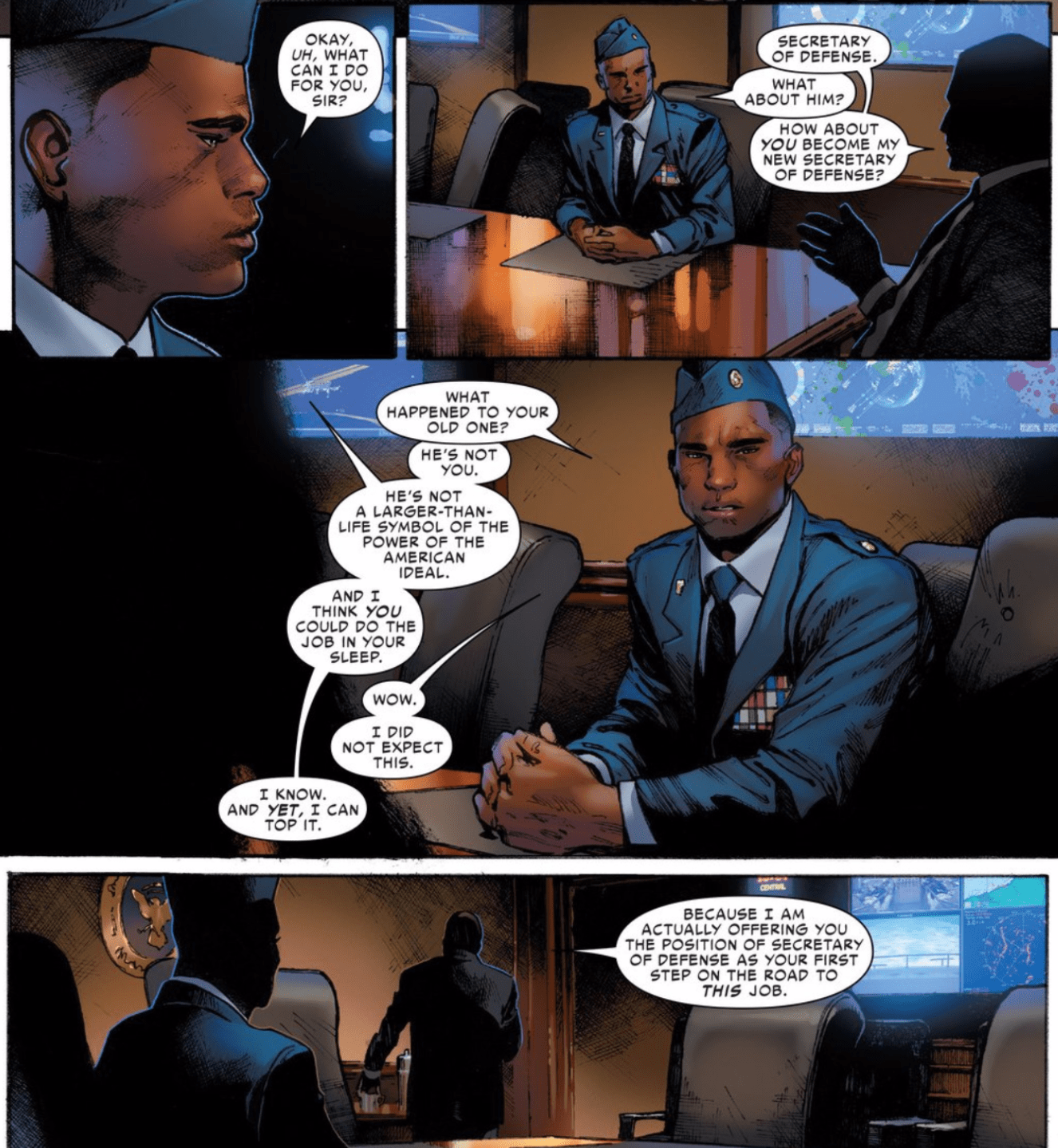
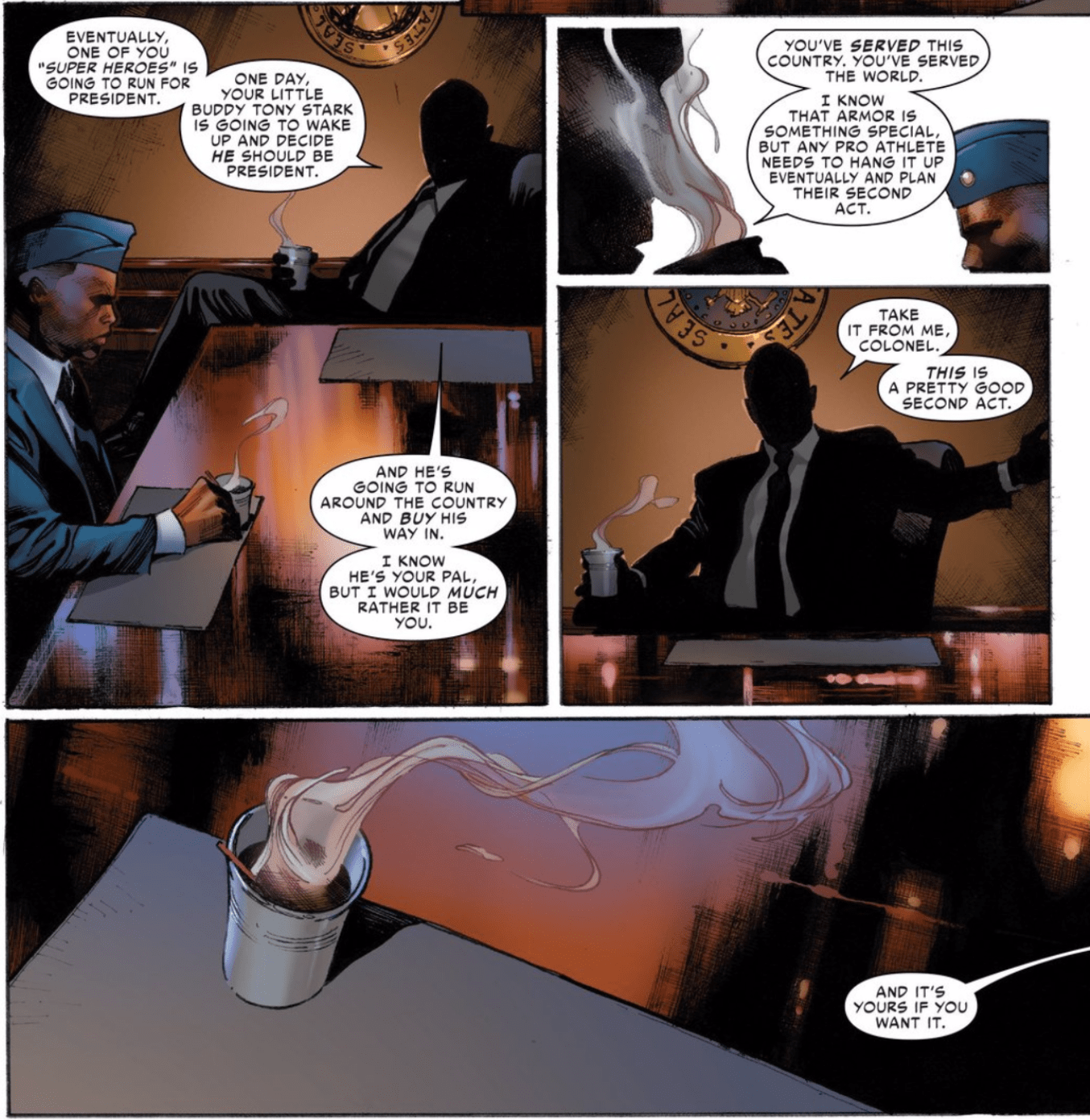
I know there’s no malice meant in this plot development. I know Marvel says that it cares deeply about diversifying its characters and creative talent. Nevertheless, when taken in the aggregate, the story beats that lead up to Rhodey’s death feel cruel. We see Rhodey and Carol Danvers being affectionate and cute together; Rhodey and Tony Stark joshing with each other after a major victory; Rhodey and the leader of the free world talking about his possible future in politics.
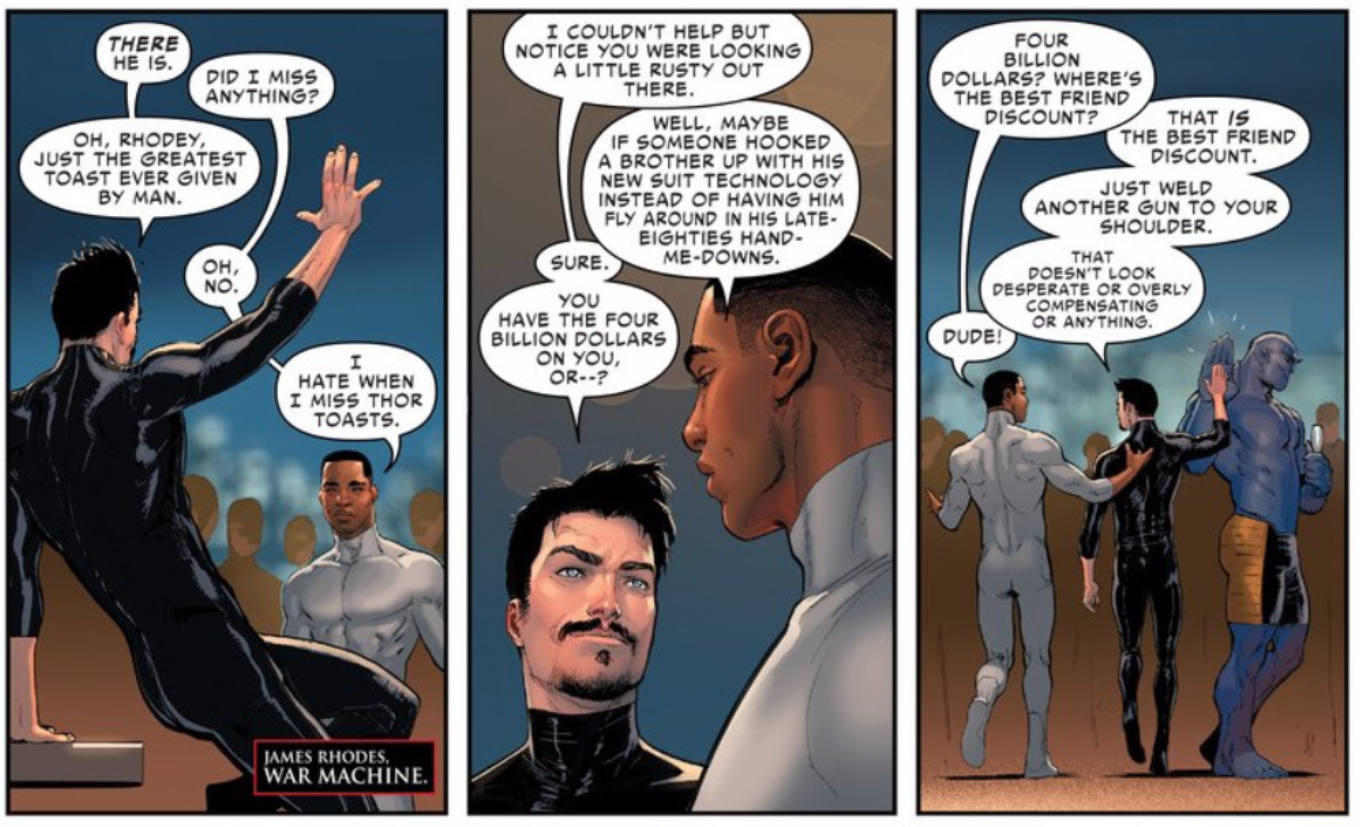
Rhodey’s death is supposed to hurt. It’s the catalyst that sparks the hero-vs-hero action. To some readers, Rhodey’s death will be just another instance of an overused trope, death-as-plot-device. James Rhodes is just another character, right? Yes and no.
To have a character like Rhodey — who has embodied duty, loyalty and sacrifice — get snuffed out for a comic meant to draft off a major Hollywood movie hurts in a deeper way than Marvel intended. To be a black nerd is to constantly feel like your avatars and totems are at risk of erasure. It can feel like the pop culture characters that look like you exist by the grace and whims of capricious masters, many of whom have never experienced the same thirst for representation. The field of black superheroes is still so shallow that each loss reverberates with disproportionate tremors.
Part of me asks myself, “Why should I be mad that Rhodey’s dead, when the Black Panther (my favourite superhero) has the best-selling comic book of 2016?” The best answer I come up with is based on saturation. The shifting fortunes of superhero comics publishing can mean that favourite characters (and creators!) can be pushed offstage or mired in mediocrity for huge chunks of time. When it’s a black character, it can be years. When T’Challa was on the sidelines of the Marvel Universe in the 1980s, declawed by his handlers’ lack of enthusiasm towards his character, Rhodey was on the Avengers. Tony Stark’s best friend was wearing the red-and-gold while the cool exec with the heart of steel battled with alcoholism.
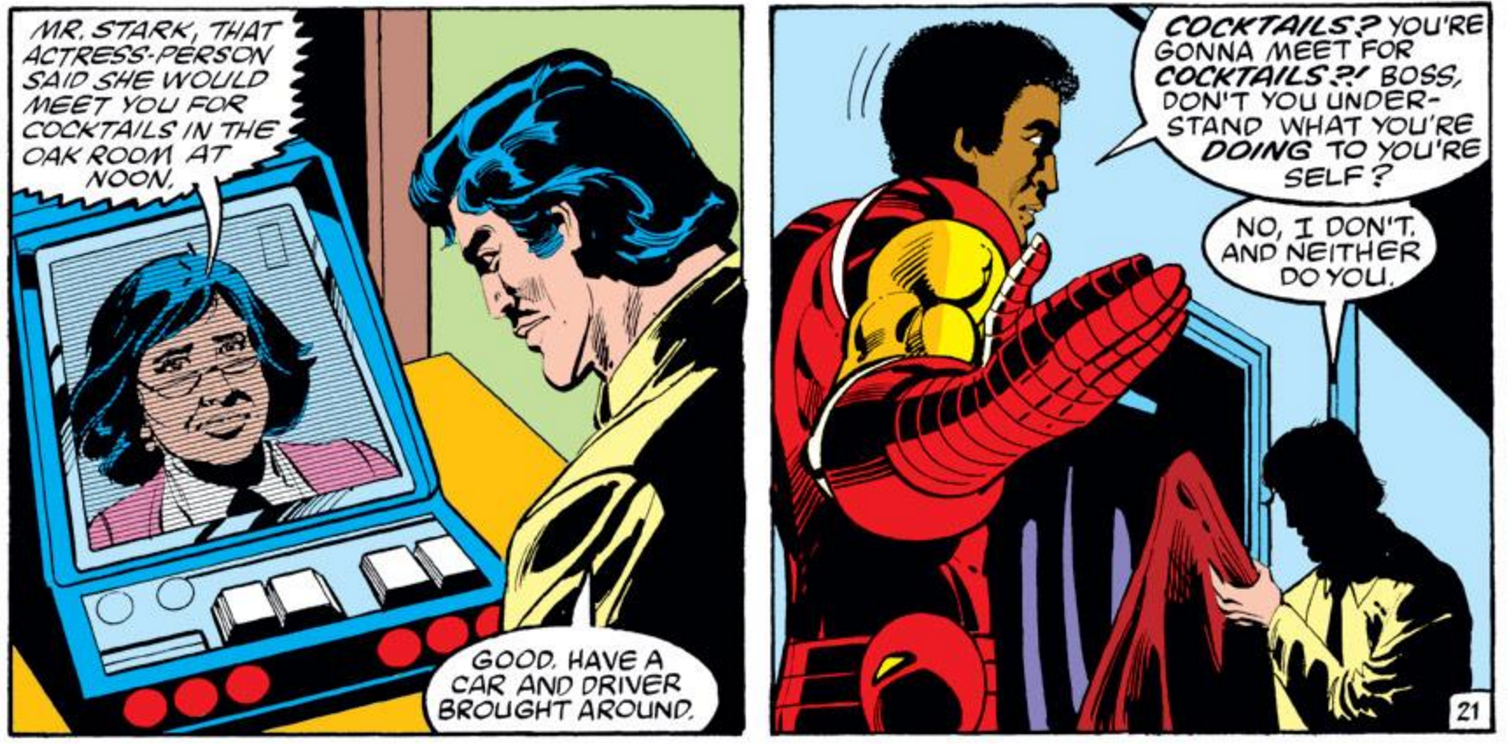
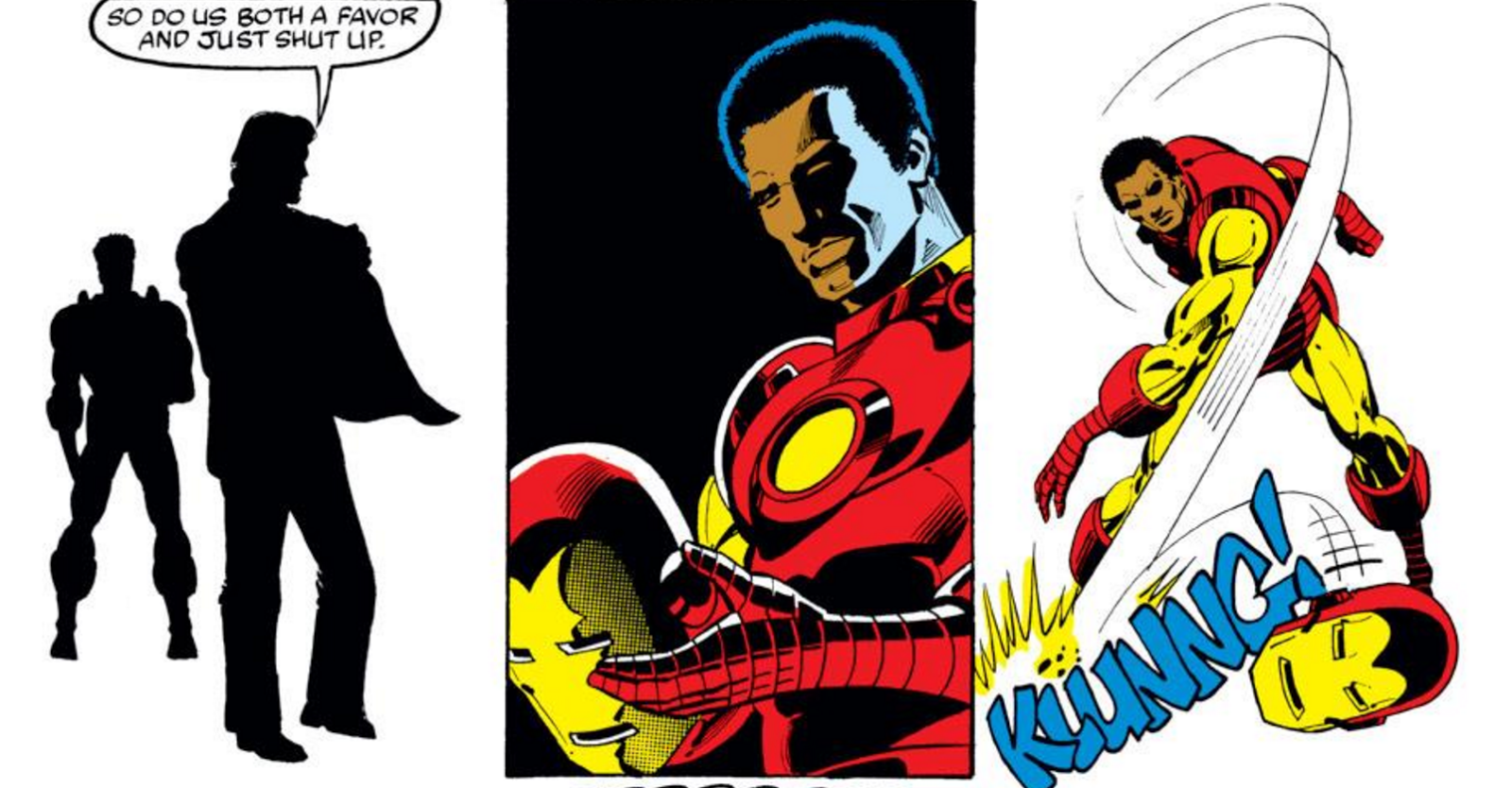
He was in Marvel’s game-changing Secret Wars crossover and, if memory serves, he was one of only four black characters in the whole series. (Storm and Monica Rambeau/Captain Marvel were also in that crossover, and I’m going off memory here but I’m pretty sure that villain Thunderball was too.) He was involved in the centre-stage drama and, if he didn’t exist at that moment, my formative nerd years would have been poorer.
Sure, it’s good storycraft to use death to illustrate stakes. But there are other stories that could have been told, other characters that could have carried that weight. I have to imagine that Marvel editorial already knew that black-guy-dying-nobly is a tired trope that would annoy parts of their audience. In fact, I don’t have to imagine it.
In an interview on Newsarama, Marvel’s executive editor Tom Brevoort says there was internal discussion about the creative choice:
I don’t want to be too coy about this. As far as the story is concerned, Rhodey is dead. You’ve given me the opportunity to play the game where I tease that he may still be out there, but that’s not what this moment is about. This moment is legitimately about Rhodey being down. So not outright showing that is, as you said, good taste. But as other issues come out, you’ll see it reflected. Captain America: Sam Wilson #10 was solicited as having the funeral of a fallen hero, and Rhodey is that character. You’ll see the effects of this moment in Captain Marvel, Invincible Iron Man, and other titles across the line.
I could play games with you, but I’m actually going to give you the flat out honest answer, which is, he’s done. As far as this story is concerned. In the future, anything is possible, but Thanos did take him out.
Nrama: Following up on that, you know as well as I do how conversations on the internet go. It’s only a matter of time before someone asks why the first confirmed casualty of Civil War II was a black man. Can you address the decision making behind killing off War Machine?
Brevoort: In terms of Rhodey, we were not unaware that killing Rhodey meant we’d have a story where an African American character dies, which is something that happens prevalently in our medium. That’s a conversation that we had. In our particular retreat where we talked about this, Ta’Nehisi Coates was in the retreat for the first time. He heard all of this, and afterwards, he sent a long missive to myself and Axel, which we forwarded to Brian and we all spoke about, in terms of what he thought the reaction would be and what the ramifications would be, that we had to consider that from all sides. And we have.
But the thing that makes Rhodey the only choice to be that character is that Rhodey is the one player who has a specific relationship with Tony, and a specific relationship with Carol. He stands firmly in favour of “predictive justice”, and chooses to act on Ulysses’ visions. Even though it costs him his life, it’s a choice he would make again, given the opportunity. His death serves to galvanize them in both of their trajectories in the way the death of any other character just wouldn’t. It was not necessarily a popular choice, knowing we’d get that response — and justifiably so. It seems like it’s always the black hero who dies in these kind of stories. But at least in this instance I feel like we stand on decent ground saying if there had to be a death, it should be Rhodey because of his relationship with the characters, not because of the colour of his skin or his lack of prominence in the Marvel Universe.
(Quick aside: Civil War events are built around philosophical differences that split heroes into factions and, so far, the consequences of that rift rob the life from a black body each time out. You’d think that Marvel might have been conscious of the uncomfortable echoes of killing black characters in blockbuster events named after a war fought over slavery. But here we are.)
This isn’t call for any sort of special protected status for black superheroes. Consider it, instead, a catalogue of loss. When I came across Rhodey, I badly needed him to exist. I encountered him around the same time that I fell in love with Luke Cage. He and the other members of the superhuman African diaspora I’d encounter in Marvel and DC comics eased the pangs I had for representation in the medium I loved.
Guys like Bill Foster weren’t cutting it. He was a scientist who became a skyscraper-tall superhero in the 1970s and ultimately became the black man who died in Civil War 1. He was a character made for the express purpose of making Marvel look less lily-white. He never had memorable moments where he shone brighter than other characters around him. Even I, black superhero enthusiast that I am, wasn’t checking for Black Goliath/Giant-Man II/Brother in the Lab Coat like that. Nobody’s clamouring for a Bill Foster resurrection. It’s different with Rhodey.
Rhodey was more than just a black Iron Man stand-in. He was a symbol that showed you didn’t have to be a rich, white playboy genius to make the world a better place. What makes the pain even worse is my nagging suspicion that, given Brevoort’s comments, Rhodey probably isn’t getting a turn in the ol’ superhero comics resurrection machine any time soon. His various solo series over the years haven’t ever found enough of an audience to make him a priority.
Rhodey was an important character for reasons other than his proximity to Tony Stark, because there are still corners of the Marvel Universe where it makes more sense for War Machine, not Iron Man, to be the one fighting evil. Greg Pak’s criminally underrated 2008 War Machine series had Rhodey taking on corporate/military bad guys with extreme prejudice, partially because he came from a community that wasn’t insulated from ripple effects of their wrongdoing like Tony Stark was. He’s always been more down-to-earth than his billionaire best friend and an example of the idea that heroes can come and should come from anywhere.
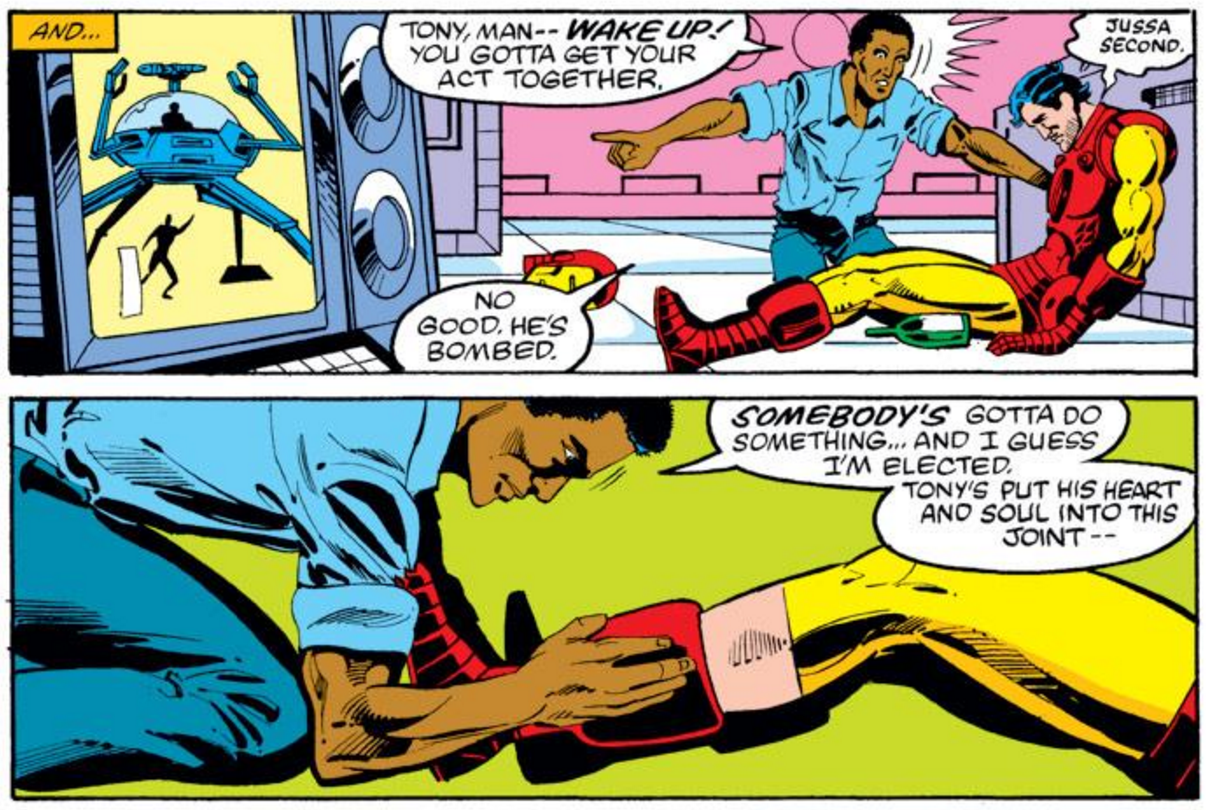
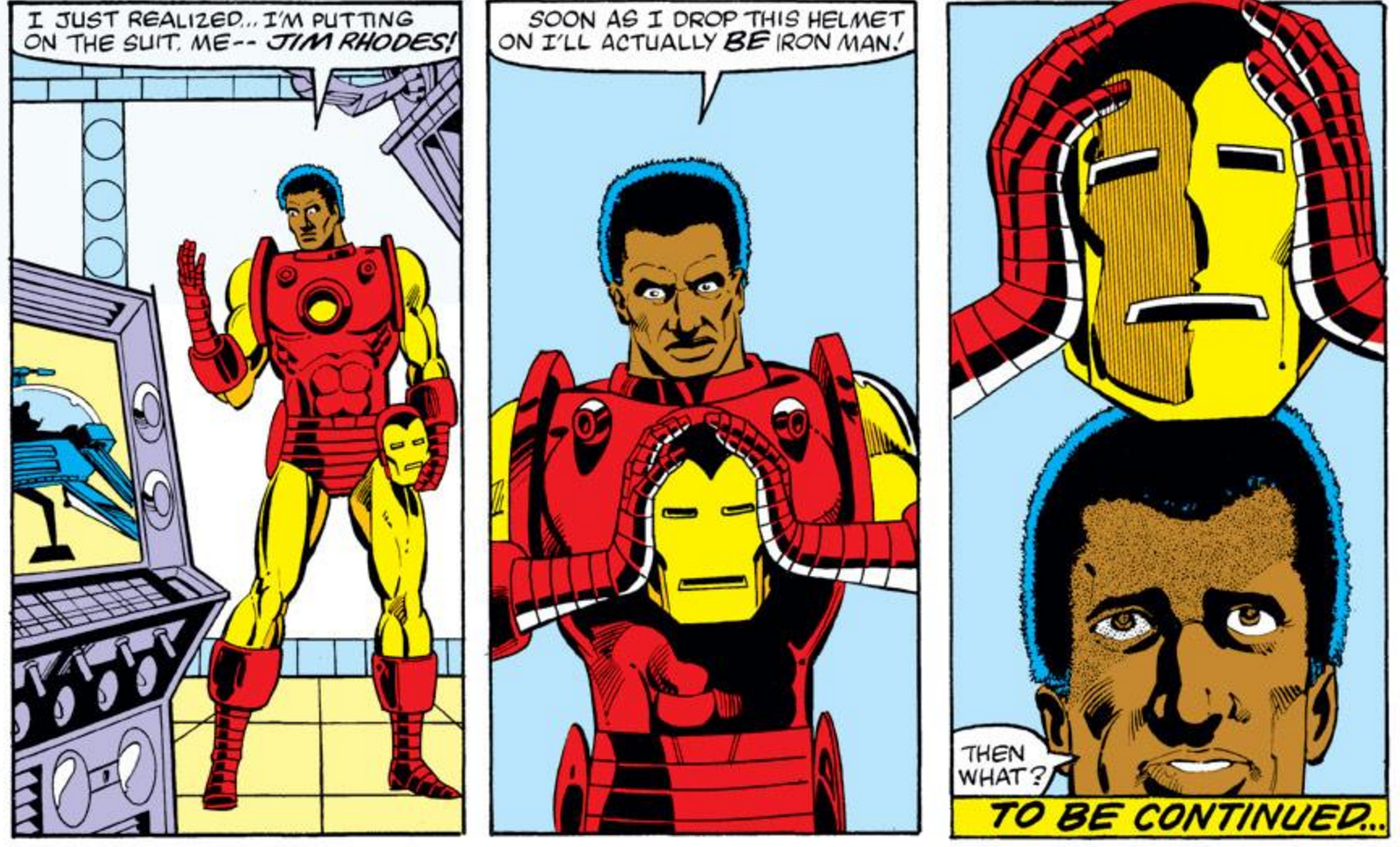
It feels cheap to have all that erased for a chess game where the faction leaders are non-black characters. Rhodey may have just been a knight in Marvel’s fiction but he was a king in the hearts of at least some fans. James Rhodes was a character who grew into a superhero identity that became differentiated from the mythos he sprang from. War Machine wasn’t just a cool name; it was a moment that made it feel like he became his own kind of hero. And hell, why couldn’t Rhodey have been the one leading the charge on the pro-prophetic interventionist side? With a long, winding hero career like his, he could have been easily written to have had a strong stance against his friend Tony.
That could arguably have been a better story, where Rhodey wouldn’t have had to die for the beliefs Brevoort cites. He could have just fought for them and lived with being on either the winning or losing side, growing further over a career that would have continued. The diversification efforts of recent years have had ignited fan debates over which character can be called the “real” Thor, Captain America or Spider-Man. Marvel doesn’t just lose the published, on-panel history when a character like Rhodey dies like this. They lose trust, too.
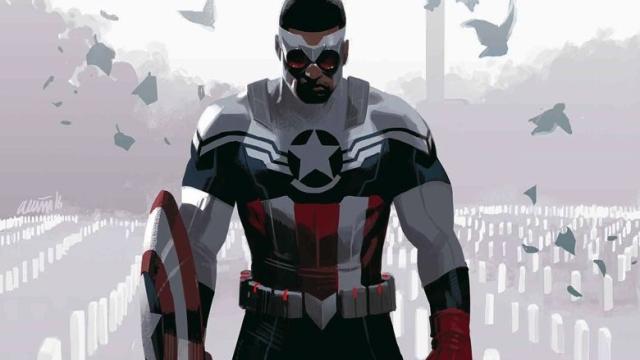
Comments
5 responses to “Marvel’s Civil War Comics Live Up To Their Name In The Worst Way”
The way I see it, they killed a long time friend of Tony Stark. This pushes things from a idealogical war into a personal war. It’s a suspense builder… But no, people only see Rhodey as a “black man”, not the person he was and will be again. Remember, no one except for Uncle Ben (And even that is now debatable) stays dead in the Marvel Universe.
Nobody gave a shit about Goliath (at least not many, anyway) and so his death didn’t have much impact; but War Machine tugs on the heart strings of plenty people without sacrificing any A-List heroes like Luke Cage etc.
If you’ve ‘lost trust’ over such a thing, then I strongly believe you’re reading far, far too deeply into this — or conversely, not deeply enough;
He is a lynchpin and a crux for a major character. If you don’t like the narrative that’s entirely okay; we’re all welcome to our own opinions of course, but I think trying to drag race-baiting into it is poor form and you’re putting the black man on a pedestal merely by virtue of being drawn black.
And anyway, War Machine, man? Pfffft. Luke Cage > Black Panther > War Machine. Come at me.
It all makes sense now. We make a Thor a woman so we can kill the black man.
I jest, but surely we don’t read Marvel comics for a diverse representation of the human race? I mean it’s a pretty accurate representation of the American race but that’s about it.
I mean I’ve read these comics since I was a kid and I don’t have a single hero with my ethnic background; there’s more lesbian, gay, black, female and mexican heroes than South Asian or South East Asian for that matter.
I’ve gotta say, the premise for Civil War 2 seems pretty dumb; we’ve got a guy who can predict crime, so should be use his predictions as evidence of things that haven’t happened? Come on.
1) In the Marvel Universe time is malleable. Every year it seems you get characters appearing from timelines that are then erased, eg Age of Ultron, Days of Future Past, etc. If the present can be changed so these crimes never happen, then of course preditctions shouldn’t put someone in prison. Especially considering the ACTUAL crimes that superheroes get away with (remember that time X-23 killed people for the Kingpin? Or Gambit and Fantomex being professional thieves?)
2) People who can see the future are not new in the Marvel universe. Rogue’s mother Destiny was one such person, as is the mutant Blindfold, or pretty much every time traveler ever. Why is this new Inhuman such a big deal?
3) A system of information gathering that solely relies upon the services of one, irreplaceable person is a bad system. What happens if that person dies or decides to game the system (i.e. lie) for their own benefit?
4) This new inhuman is probably going to turn out to be a bad guy (my money’s on Kang).
I dunno, the justification of the authors seemed quite good and honest to me, to the point where they admit that the trope was what made the decision difficult, as it was in every other regard, logical.
I understand how for the writer this may be a bigger deal, and I sympathise, but I don’t think it was a random or stereotypical choice nor I think it spells doom for the series as the title implies.
Also, he’ll be back by the end of the year. We all know this.
If they didn’t like Rhodey, couldn’t they have just replaced him with Don Cheadle?